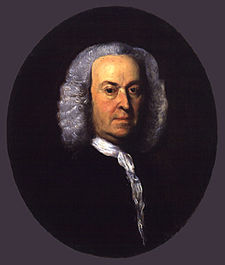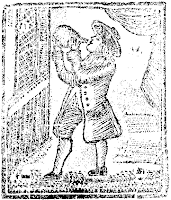“My succeeding to the post he holds from the crown”
Rogers was the author of one of the “Hutchinson Letters” that Benjamin Franklin leaked to the Boston Whigs in the spring of 1773.
Gov. Thomas Hutchinson wrote only six of those letters. Another six came from his friends and political allies (four from Andrew Oliver, shown here, and one each from Charles Paxton and Robert Auchmuty), and the last from his nephew, Rogers.
Those letters were collected by Thomas Whately, a Member of Parliament interested in the administration of the American colonies. Many of the writers discussed the challenges of governing Massachusetts, with some hints or recommendations about changing its constitution.
In contrast, Rogers’s letter was all about wanting the job of provincial secretary. It reveals just how such appointments were negotiated in this period, with a lot of discussion about money and little about the public interest or policy.
Boston, Decem. 12th 1768.Rogers thus privately lobbied for annual payments to Oliver as lieutenant governor that would be equal to the secretary’s salary and thus make it worthwhile for him to vacate that post. If those arrangements couldn’t work out, Rogers even promised to pay Oliver £100 a year himself until the man (already “advanced in life”) died. These days we’d consider this scheme a kickback, a sinecure, and taxation without representation. In the British patronage system of the eighteenth century, it was common.
My Dear Sir,
I wrote you a few days ago, and did not then think of troubling you upon any private affair of mine, at least not so suddenly; but within this day or two, I have had a conversation with Mr. [Andrew] Oliver, secretary of the province, the design of which was my succeeding to the post he holds from the crown, upon the idea, that provision would be made for governor [Francis] Bernard, and the lieutenant governor [i.e., Uncle Hutchinson] would succeed to the chair, then the secretary is desirous of being lieutenant governor, and if in any way, three hundred pounds a year could be annexed to the appointment.
You are sensible the appointment is in one department [i.e., the Colonial Office], and the grant of money in another [the Treasury, funded by Customs revenue under the Townshend Act]; now the present lieutenant governor has an assignment of £200 a year upon the customs here; he has not received any thing from it as yet, and is doubtful if he shall; he has no doubt of its lapse to the crown, if he has the chair; if then by any interest that sum could be assigned to Mr. Oliver as lieutenant governor, and if he should be allowed (as has been usual for all lieutenant governors) to hold the command of the castle, that would be another £100. This would compleat the secretary’s views; and he thinks his public services, the injuries he has received in that service, and the favorable sentiments entertained of him by government, may lead him to these views, and he hopes for the interest of his friends.
The place of secretary is worth £300 a year, but is a provincial grant at present, so that it will not allow to be quartered on: And as I had a view upon the place when I was in England, and went so far as to converse with several men of interest upon it, tho’ I never had an opportunity to mention it to you after I recovered my illness—I hope you will allow me your influence, and by extending it at the treasury, to facilitate the assignment of the £200 a year, it will be serving the secretary, and it will very much oblige me.——
The secretary is advanced in life, tho’ much more so in health, which has been much impaired by the injuries he received, and he wishes to quit the more active scenes; he considers this as a kind of otium cum dignitate, and from merits one may think he has a claim to it.
I will mention to you the gentlemen, who are acquainted with my views and whose favourable approbation I have had. Governor [Thomas] Pownall, Mr. John Pownall, and Dr. Franklin.—My lord Hillsborough is not unacquainted with it—I have since I have been here, wrote Mr. [Richard] Jackson upon the subject, and have by this vessel wrote Mr. [Israel] Mauduit.
I think my character stands fair—I have not been without application to public affairs, and have acquired some knowledge of our provincial affairs, and notwithstanding our many free conversations in England, I am considered here as on government side, for which I have been often traduced both publickly and privately, and very lately have had two or three slaps. The governor and lieutenant governor are fully acquainted with the negociation and I meet their approbation; all is upon the idea the governor is provided for, and there shall by any means be a vacancy of the lieut. governor’s place.
I have gone so far, as to say to some of my friends, that rather than not succeed I would agree to pay the secretary £100 a year out of the office to make up £300, provided he could obtain only the assignment of £200—but the other proposal would to be sure be most eligible.
I scarce know any apology to make for troubling you upon the subject; the friendship you shewed me in London, and the favourable expressions you made use of to the lieut. governor in my behalf encourage me, besides a sort of egotism, which inclines men to think what they wish to be real. I submit myself to the enquiries of any of my countrymen in England, but I should wish the matter may be secret ’till it is effected.
I am with very great respect and regard, my dear sir,
Your most obedient, and most humble servant,
NATH. ROGERS.
Rogers’s planning helps to explain why, despite his Whiggish political philosophy, he accepted the Townshend Act and resisted the non-importation effort to stop it. And his string-tugging worked. When Rogers died, the London government was preparing a commission to make him provincial secretary. Instead, in his absence the job went to Thomas Flucker.
After this letter became public in 1773, the Boston radicals interpreted it as more evidence of the Hutchinson circle scheming to take powerful positions and Customs revenue for themselves. John Adams judged that Hutchinson and Oliver had been among “the original Conspirators against the Public Liberty, since the Conspiracy was first regularly formed, and begun to be executed, in 1763 or 4,” but “Nat. Rogers, who was not one of the original’s,…came in afterwards.”





